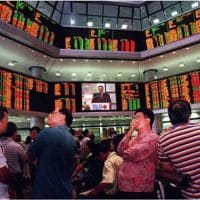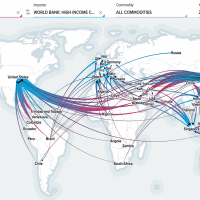-
Bubbles, stocks and crashes
WHAT is happening in the U.S. economy provides an object lesson on the functioning of neo-liberal capitalism. Pre-first world war capitalism which had witnessed the long Victorian and Edwardian boom had relied on the colonial arrangement for the system’s dynamics.
-
Marx on imperialism
On February 19, 1881, Karl Marx had written a remarkable letter to N.F. Danielson, the renowned Narodnik economist who had also gone under the name of Nikolayon and whose work had been much discussed by Lenin.
-
Neo-liberal capitalism and its crisis
“Neo-liberal capitalism” is the term used to describe the phase of capitalism where restrictions on the global flows of commodities and capital, including capital in the form of finance, have been substantially removed.
-
The current upsurge of fascism
To describe the present upsurge of fascism as nationalist or populist would be misleading. Neither is it a replication of the fascism of the 1930s. However, it is marked by four features, which have been common to all fascist upsurges in the past, namely: rise of supremacism, apotheosis of unreason, proliferation of fascism as a movement, and intertwining of fascist movement and corporate capital.
-
Twenty years after the Asian financial crisis
The hegemony of international finance capital, which led to economies “opening” themselves up to the vortex of global financial flows, demolished both Nehruvian dirigisme and East Asian neo-mercantilism. And the same hegemony has now brought the world capitalist economy to a crisis from which it is in no position to recover.
-
Prabhat Patnaik on contemporary capitalism and the shape it takes in India
I think Marxism analyses the contemporary world in a way which nobody else did. Lenin had said the strength of Marxism lies in the fact that it is true. The point is that it is a genuine scientific discovery.
-
Imperialism still alive and kicking
With the reassertion of the dominance of finance, in the guise now of an international finance capital, the third world States have withdrawn from supporting petty producers, a process of income deflation is in full swing, and the imperialist arrangement is back in place, because of which we can see once more a tendency towards a secular decline in per capita food-grain availability in the third world as in the colonial period.
-
New Perception of Imperialism
If accumulating wealth is the basic objective of capitalism, organising production using wage labour is only one of the ways it can be achieved. What finance does is to open an alternative route to reach the same objective, that is via transaction.
-
Developing “Infrastructure”
The term “infrastructure” covers all sorts of things, from ports to roads to canals to bridges to building railway lines. Because it covers such a range of things, many of which appear to be useful, most people look upon “infrastructure” development as an indubitably desirable thing under all circumstances. Questions are scarcely asked about its worthwhileness when the government allocates larger resources for the “infrastructure” sector, or when it instructs public sector banks to give larger loans for “infrastructure” development.
-
Migration as Revolt against Capital
The fact that a large number of refugees, especially from countries which have been subjected of late to the ravages of imperialist aggression and wars, are desperately trying to enter Europe is seen almost exclusively in humanitarian terms. While this perception no doubt has validity, there is another aspect of the issue which has escaped […]
-
Why Do We Have Unemployment?
Unemployment has become so persistent a phenomenon in contemporary times that there is a common feeling that it is a “natural” state of affairs, that nothing can ever be done about it, and that the only way to have greater employment opportunities coming your way is either to oppose the system of job “reservations” for […]
-
The Challenge Before the Latin American Left
The Left upsurge in Latin America appears to be abating. In October 2015 Jimmy Morales, the conservative candidate in Guatemala, defeated the Left-leaning Sandra Torres in the presidential elections. On November 22, Mauricio Macri, the conservative presidential candidate in Argentina, defeated Daniel Scioli, his Peronist rival, by a narrow margin, to bring to an […]
-
The Devaluation of the Yuan
The Chinese central bank’s decision last week to let the yuan depreciate, in three stages by almost 4 percent against the US dollar, was officially explained as a move towards greater market determination of its exchange rate. Though this explanation pacified stock markets around the world, China’s devaluation of the currency portends a serious accentuation […]
-
Europe’s Moment of Truth
Greek Premier Alexis Tsipras’ acceptance of an “austerity package” on July 13, which contained measures rejected by the Greek people in a referendum barely a week before, represents not just an abject surrender by the Syriza government, or a sign of contempt on the part of German finance capital for the Greek electorate; it marks […]
-
The Spectre of the Thirties
The Reserve Bank of India, as is to be expected, has been denying that its governor Raghuram Rajan had ever suggested that the world was facing the possibility of a 1930s-type Great Depression. Members of the “global financial community” are not supposed to say such things; so even if Dr Rajan did, a denial was […]
-
The Declining World Foreign Exchange Reserves
If one adds up the foreign exchange reserves of all the countries in the world, including under the term “reserves” what these countries hold in the form of gold, US dollars, other reserve currencies, Special Drawing Rights of the IMF, and also liquid assets such as short-term Treasury Bills of the US government, then the […]
-
Misconceptions about Neo-Liberalism
Neo-Liberalism is often seen only as an economic policy. This per se might not matter, since a specific set of economic measures do, no doubt, fall under the rubric of neo-liberalism. But by reducing neo-liberalism only to a set of economic measures, a misleading impression is often conveyed that this set of measures are a […]
-
Syriza’s Slip
The victory of a Left Alliance, Syriza, in the Greek elections on January 25, was a matter of great significance, especially because that victory was based on a promise that Syriza would get rid of the memoranda imposing austerity on Greece by the “Troika” (the European Union, the European Central Bank and the IMF). Syriza’s […]
-
The Importance of the “Economic”
The world today is witnessing a rather novel phenomenon, namely a pervasive tendency towards political uprisings by the urban middle class. Not just the leaders, but even the bulk of the participants in such uprisings are educated, are reasonably well-off, and make extensive use of social media channels for keeping in touch with one another. […]
-
The Spectre of Social Counter-Revolution
5th Dr. BR Ambedkar Memorial Lecture, Indian Institute of Dalit Studies, New Delhi, September 27, 2014 I I would like to use this occasion to dwell upon a point to which Dr Ambedkar had drawn attention in his closing speech to the Constituent Assembly on November 25, 1949. In that speech he had underscored a […]








